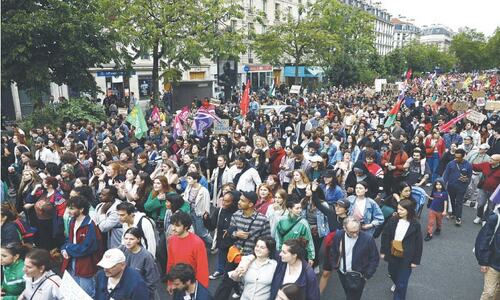BAGHDAD: Civil war. It’s a phrase everyone in Iraq has strenuously avoided for the past two years. Yet now, with no government formed three months after elections, and tensions deepening between Iraq’s different Muslim sects and other groups, it’s on many people’s minds.
Several clashes between Sunni and Shias in events apparently unrelated to the two-year-old anti-US insurgency have highlighted the danger in recent months.
Whereas once politicians were not willing to utter the term for fear of dignifying it, it is no longer taboo.
“I do not want to say civil war, but we are going the Lebanese route, and we know where that led,” says Sabah Kadhim, an adviser to the Interior Ministry who spent years in exile before returning to Iraq after Saddam Hussein’s overthrow.
“We are going to end up with certain areas that are controlled by certain warlords ... It’s Sunni versus Shias, that is the issue that is really in the ascendancy right now, and that wasn’t the case right after the elections.”
In Madaen and other mixed Sunni-Shia towns on the rivers south of Baghdad, rival groups have been carrying out revenge attacks since before the January polls, police said. This month more than 50 bodies have been pulled from the Tigris river.
In the poor Shia district of Shuala in western Baghdad, there has been a series of car bombings and killings, apparently related to tensions with Sunni militants in the neighbouring district of Abu Ghraib, one of Iraq’s most violent.
Similar violence has hit towns north of Baghdad, such as Baquba, where Sunni and Shia mosques have been bombed.
In part the tensions are the result of the long-declared intention by Sunni militants such as Jordanian Abu Musab al-Zarqawi to sow sectarian discord and provoke civil war.
But they also reflect a natural increase in animosity between the two sects since the Jan. 30 poll, which handed power to the Shias majority after decades of Sunni-led rule of dictator Saddam Hussein.
The failure to form a government in the immediate aftermath of the ballot has allowed distrust to grow as all sides scramble to secure a share of power.
“The huge window of opportunity created by the success of the elections has been frittered away in the politics of personal gain and internecine squabbling,” said Toby Dodge, an Iraq expert at Queen Mary University of London.—Reuters











































Dear visitor, the comments section is undergoing an overhaul and will return soon.